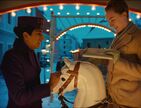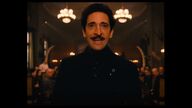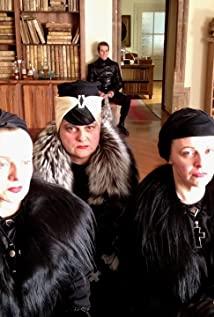To sum it up, this painting has a lot in common with the works of the Nordic Renaissance in style. But at the core is a clear moral symbol. The apple in the boy's hand is exactly the same as the one used by the snake to lure Eve in the Garden of Eden. In other words, this is a picture of temptation. And sensuality and emotional enjoyment (whatever you say) is the characteristic of mannerist. This doctrine is mainly to lengthen the neck and limbs to make it more elegant (or pretentious). The boy's peacock-like fingers are very mannerist.
What? I thought it was Newton or Jobs when he was young.
Although Mr. Gustave looked pretty young, in the eyes of Madam D, who was even younger, it was probably always small, fresh, and meat full of allure.
Mannerism connected with Baroque after the Renaissance. The representative painter is Bronzino. In addition to him, Wes Anderson also used Dürer, 17th-century Dutch painters, and even Tudor paintings for Taylor as a reference. The whole painting is like a carefully set shadow that looks probably in the late Renaissance.
The film is on the verge of the end of an old era. Zero's words at the end of the film were: "His world disappeared before he entered. But he maintained the illusion of that world with great elegance."
Mr. Gustave is a concierge. Most of his elegance is the nature of the facade, he is still a thief in his bones. For example, he promised Madam D that he would go to the church to help her light candles, turn around and ask Zero to light the most common candles, and eat cakes afterwards. But his appearance skills are really remarkable, and it is also a pleasure to watch him telling Zero to do things one by one. Like all the outstanding employees working downstairs, their behavior is always a little excessive. The old days did not belong to them, but they always insisted on the etiquette rules more than the owners living upstairs. Just as grace itself stretched its neck.
Under this set of practical mannerism, Mr. Gustave is also a shadow, reflecting the era before him.
Although Mr. Gustave is a chicken thief who is elegant and elegant, he is a chicken thief, and he saved Zero's life on the train at a critical moment, and saved him twice. The sentence repeated in the film "Although human society has given way to the slaughterhouse, there is still a trace of civilization." The first time it was after Edward Norton appeared to rescue them, Mr. Gustave still used him. He said it in a mannerist's tone, and couldn't say it halfway through. He died the second time. At this time, the noble humanity that the old era may represent is revealed. The story completely ended an era with his death. There is still a trace of civilization, but as the train rumbles into the war years, the cost is getting higher and higher.
Wes Anderson's movies are essentially adventure comics of little boys placed in the camera. I always think they are very suitable for family fun. It's more sophisticated and enjoyable than Dinny's cliche variation, isn't it? Later I found out that your film was classified as R. Fingers falling at the door. Oh, it hurts.
View more about The Grand Budapest Hotel reviews











